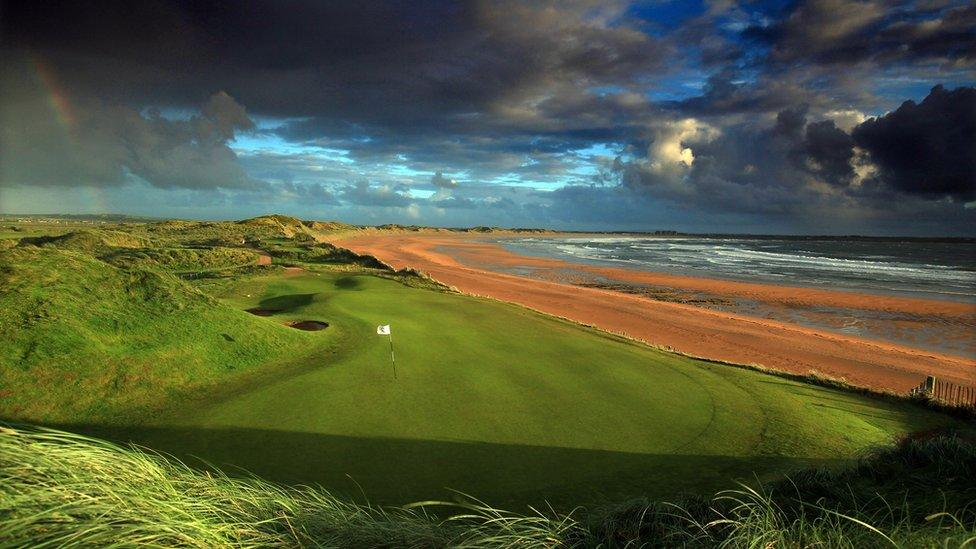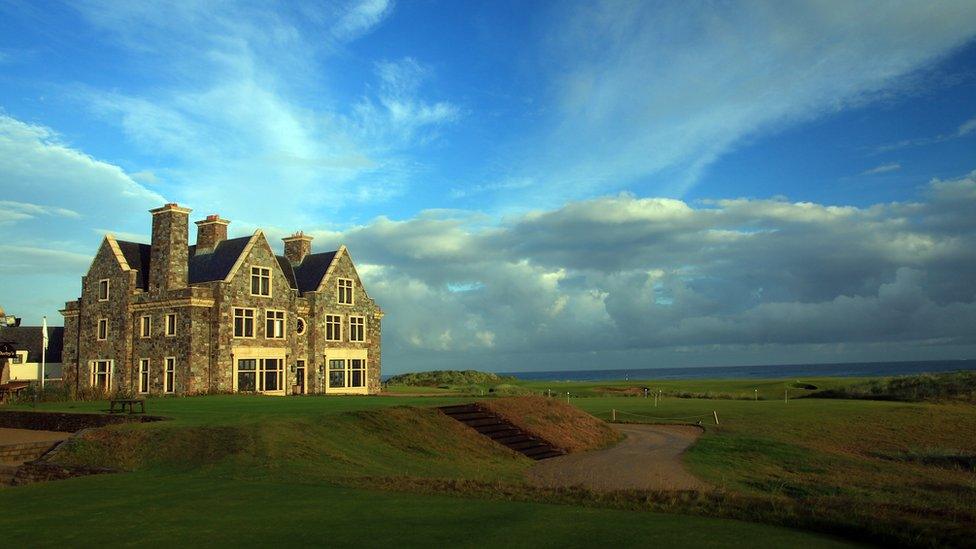Green delight as Trump's Irish wall plans withdrawn
- Published

The Doonbeg golf course has suffered from significant erosion over the years
Donald Trump's plan to erect a huge sea wall at his Irish golf course has been withdrawn in the light of stiff opposition.
The original application cited rising sea levels as a result of climate change as a key reason for the protective barrier.
But environmental campaigners opposed the two-mile long development saying it threatened a rare breed of snail.
A new plan with smaller wall is expected to be submitted shortly.
Sea level threat
The Trump International hotel and golf links at Doonbeg on the west coast of County Clare was acquired in 2014.
Storms that year caused significant erosion of sand dunes at the course and the Trump organisation submitted plans to Clare County Council to build a two-mile (2.8km) limestone wall to limit the impact of the seas.
At 4m in height and 20m wide, the 200,000-tonne structure would have required some 200,000 tonnes of rock for construction.
The €10m wall would protect against the wasting impacts of the seas, the original application said.
The documents went on to detail that "the rising sea levels and increased storm frequency and wave energy associated with global warming can increase the rate of erosion".
The wall would also benefit the community, the documents said, by way of the coastal protection works.
While the plan was heartily supported by many local residents and businesses, there was considerable opposition from environmental groups. There was concern that the wall would impact the tiny, EU protected whorl snail, Vertigo angustior, external.
Six months ago, the local authority went back to the Trump group for further information on how the structure would impact the Carrowmore dunes special area of conservation, external, but none was forthcoming.
"We got notification from the applicant yesterday that they were withdrawing their application," a council spokesman told BBC News.
They Trump group indicated that they had pulled their plans because the planning process would have taken way too long.
In a statement, they said that the resort contributed around 6m euros a year to the local economy. Plans to expand the facilities are being "closely considered" but protection was needed from the restless sea.
"The realisation of these plans, however, is fundamentally dependent on the provision of adequate protection from coastal erosion," the statement read.
"Since 2002, an estimated 15m to 20m of dune face has been eroded from the beach front and the golf course. All efforts at soft management of the coastline have failed. All efforts to readjust the course have also been expended."

Trump acquired the Doonbeg hotel and golf course in 2014
In a statement, the group announced plans for a scaled down version of the wall, that would stretch to 900 metres in two parts and would see metal sheet piles inserted into the ground on the golf course with limestone boulders placed around them.
Some campaigners believe that the international focus on Donald Trump's promise to build a wall on the southern border of the US, didn't help the plans for Doonbeg.
"You could tell that they were upset, because there were already analogies being made with the Mexican wall," said Tony Lowes from Friends of the Irish environment who met with the Trump camp.
"You could tell that they didn't like that because they could sense that this could turn into something more than a little planning battle in Ireland."
Around 100,000 people from all over the world signed a petition drawn up by surfing group, Save the Waves, to oppose the original plans.
Campaigners believe that the criticism that the President-elect has endured on his perceived antipathy towards the environment and climate change, didn't play much of a role in firing up the opposition.
"In this case I think the absurdity of the proposal, the outrage at what was about to be inflicted was so great, that no one could look at the proposal without being shocked," said Tony Lowes.
"I have very rarely seen an environmental case that looked so absolutely horrific."
It's expected that the new proposal will be submitted before Christmas and could be decided by March next year. Analysts will be combing through the new documents to see if there are any further references to climate change and the impact of rising seas.
Follow Matt on Twitter, external and on Facebook, external